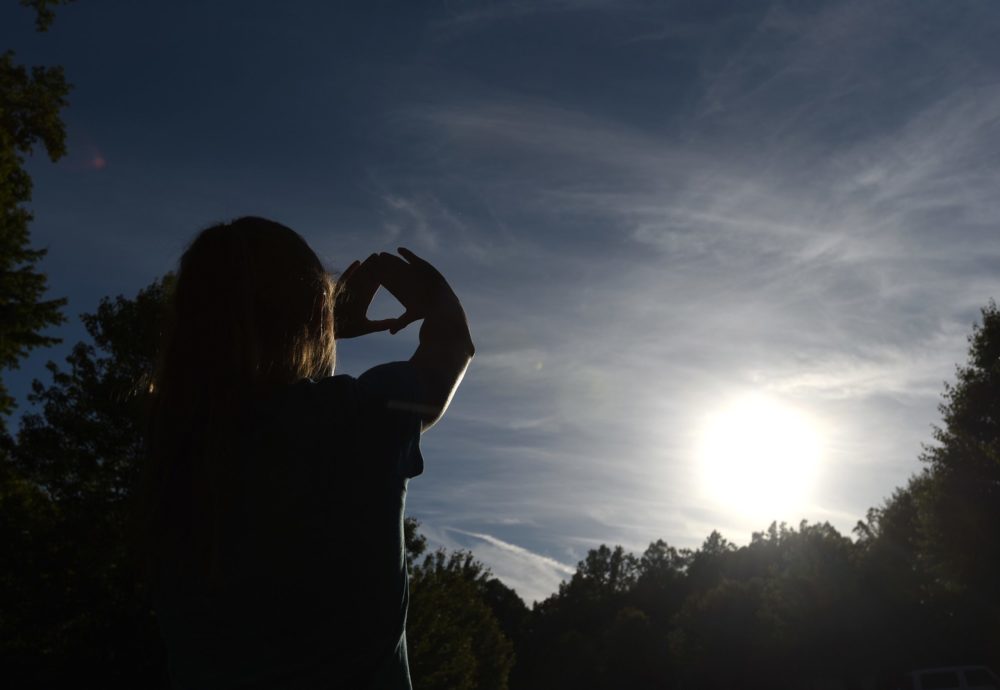
Just breathe! Kids ease their anxiety as families practice mindfulness
Photo by Philip Pavely.
Before Melanie Cowherd started mindfulness training at the Environmental Charter School at Frick Park, she’d never practiced any form of meditation.
But once the coronavirus pandemic closed the school, where Cowherd is the director of curriculum, she introduced mindfulness to her three daughters.
“For my oldest, it really has helped her with her anxiety,” says Cowherd. Fifteen-year-old Ena uses the body scan meditation method to help her sleep at night when she has a hard day or is nervous about an assignment or upcoming test.
“My youngest daughter is 5, and we practice it together so she can start embedding this practice as she gets older,” Cowherd says of Charlotte. “It helps her when she gets frustrated or anxious. We have really been practicing a lot since Covid-19 … especially when she gets scared that one of us will get sick.”
Often associated with practices including yoga and meditation, mindfulness has increasingly become a useful tool for schools and students to cope with the everyday stresses and anxieties that mark adolescence. In our recent Kidsburgh survey on mental health, nearly 90 percent of both parents and educators cited anxiety as a significant stressor. And that was before the pandemic.
How mindfulness works
“Mindfulness is noticing what’s happening internally to your mind, emotions and body, but also being aware of what’s happening around you,” says Dr. Stephanie Romero, the founder and executive director of Awaken Pittsburgh, a non-profit organization that promotes evidence-based meditation and mindfulness programs. “There’s a quality of that paying attention, which is one of being able to be with whatever you encounter with a sense of openness and curiosity. “
Mindfulness is natural for infants and toddlers “who are always in the present moment,” Romero says. “There is a quality in young children of being fully present.”
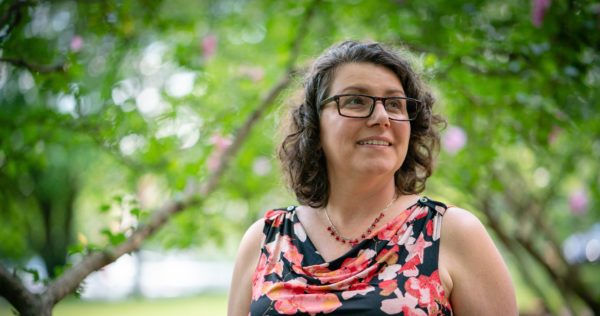
But stress and trauma experienced as kids grow up tend to “rewire the brain and your biology changes based on life experiences,” she says. “As we suffer traumatic and toxic stresses, we begin to learn how to worry, and we begin to learn how to ruminate on the past.”
Deep breathing from the diaphragm, also called belly breathing, signals the brain to calm down. The deep, slow breaths activate your body’s relaxation response, slowing your heart rate and lowering your blood pressure. In a sense, you fool your brain into thinking you are calm and your body follows that lead.
Kids who practice mindfulness are more resilient when encountering stress and may see improvement in their cognitive skills. But any form of meditation is better when parents and kids practice together.
“It’s most effective if the parents are doing this too,” says Romero. “Please don’t view this as something you can push on a kid and `fix your kid’. If you’re doing it together with your kids and modeling it with them, that’s the most effective thing to do, And I think parents also will find it so helpful just for their own self-regulation.”
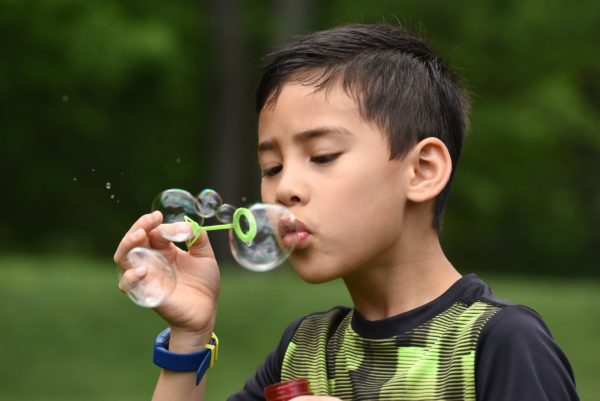
Mindfulness in schools
Kids can lead the way for parents in the practice of mindfulness from what they’ve been practicing in schools. Many Pittsburgh-area school districts started incorporating mindfulness programs as an option for students experiencing stress.
Awaken Pittsburgh has worked with more than a dozen schools, public and private, and organizations that include the Children’s Institute, to develop mindfulness programming.
Kids at South Allegheny School District have been learning to practice mindfulness along with a calming space called the “Peace Room.” Western Psych created a school-based program called C.O.O.L. Zone (Children Overcoming Obstacles and Limits) that works with elementary school kids. Sponsored in part by the Pittsburgh Penguins Foundation, the giant igloo play space gives kids a safe space where they learn to regulate emotion and alleviate stress.
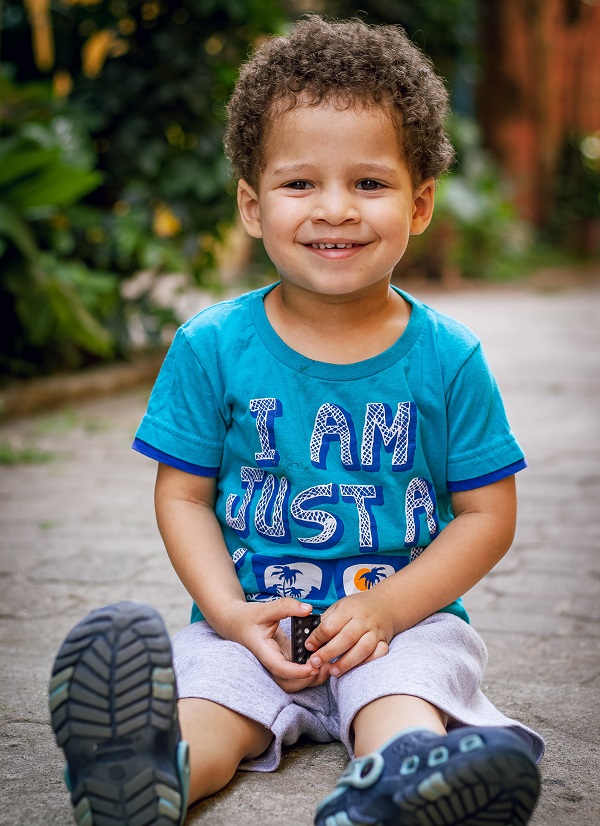
These mindfulness programs can fill a gap caused by a lack of funding for behavioral health initiatives. Dr. William Davies, founder and program supervisor of The CHILL Project at Allegheny Health Network, says schools are often in “firefighting mode,” sometimes having to provide services for 500 students per mental health counselor. The students who get the most attention tend to be the ones who display behaviors that are “maladaptive.”
“We know a significant portion of the student population, at least 40 percent, have some sort of mental health or behavioral health concern,” Davies says. But too often, he notes, the quieter kids who are internalizing their conflict and may be experiencing trauma at home get lost in the shuffle.
The CHILL Project, currently in the Baldwin-Whitehall and West Jefferson Hills school districts, provides students with a mindfulness club, among other skill-building opportunities and school-based therapy. When the coronavirus pandemic struck, The CHILL Project produced Daily Mindfulness Moment videos and shifted content to virtual platforms.
That was the same time Dr. Timothy Steinhauer, superintendent of the Mt. Lebanon School District, started his Mindful Moment, a daily livestream (often including his rescue dog Wishbone) that mixed school news with meditative exercises that Steinhauer adopted in his personal life six years ago.

“I can think of no better time to help equip kids and their parents (with mindfulness),” he says. “Giving them some of these skills and assets that can help them with stress, anxiety and help them focus. I hope it helps them cope in the present. And I hope that these are some lasting skills that they can keep for the rest of their lives.”
The practice of mindfulness has become more mainstream, especially in sports.
Basketball superstar LeBron James is featured in a commercial for Calm, a mental fitness app. Tennis star Novak Djokovic, MMA fighter Kayla Harrison, and Solomon Thomas of the San Francisco 49ers have extolled the virtues of mindfulness and meditation.
“All of our great athletes, whether they call it mindfulness or mental training or focus or being in the zone, they have strategies that they use,” says Dr. Steinhauer. “A lot of our professional teams are employing mental strength coaches, just like they do physical strength coaches. Mindfulness has never been more mainstream.
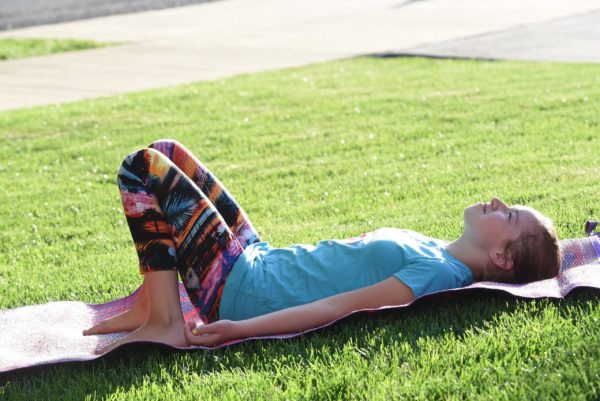
How do kids benefit?
Mindful Schools, a non-profit organization that has trained more than 50,000 teachers, educators, and parents, lists some benefits of the practice of mindfulness:
Improved attention: Numerous studies show improved attention, including better performance on objective tasks that require an extensive concentration span.
Emotional regulation: Mindfulness is associated with emotion regulation, according to many studies. Mindfulness creates changes in the brain that correspond to less reactivity, and enhanced ability to engage in tasks even when emotions are activated.
Greater compassion: People randomly assigned to mindfulness training are more likely to help someone in need and have greater self-compassion.
Reduction of stress and anxiety: Mindfulness reduces feelings of stress and improves anxiety and distress when placed in a stressful social situation.
Ready to give it a try?
Here are a few ways to begin to practice mindfulness with your family. Your kids can probably give you some tips!
Awaken Pittsburgh: In response to the pandemic, Awaken Pittsburgh holds free weekly mindfulness meditation sessions scheduled at 1 p.m. Sundays and 8 a.m. Wednesdays. Registration is required. The sessions are supported by Staunton Farm Foundation.
Pittsburgh Parks Conservancy: Find step-by-step instructions to find mindfulness within nature, whether from your front porch or in a park. Or connect to guided meditations for kids that include mindful breathing, mindful hearing and mindful seeing.
Carnegie Museum of Art: The museum offs a number of practices with Self-Care Sundays. The video sessions include breathing, forest visualization, a loving-kindness focus and empathy.
Allegheny County Parks: Join Kimberly for a virtual meditation with this beginner’s video.
Mindful Schools: Sign up for a free mindfulness class for kids and families here.
Sesame Street: Try belly breathing with Rosita by following the directions in this video.
This story is part of the Kidsburgh Mental Health Series, funded by a grant from the Staunton Farm Foundation. The Foundation is dedicated to improving the lives of people who live with mental illness and/or substance use disorders. The Foundation’s vision is to invest in a future where behavioral health is understood, supported, and accepted.
Other stories in the series include the Kidsburgh Mental Health Survey report, insight as to how parents can deal with coronavirus anxiety, and advice on remaining resilient during times that try your family’s mental health. Check out the fascinating look at the teenage brain. Other stories include Anchorpoint Counseling Ministry’s hugely successful fundraiser, the secret to happy, successful kids, and looking to Fred Rogers for help talking to kids about life’s most challenging issues.